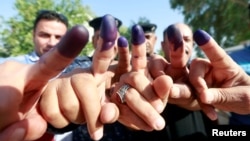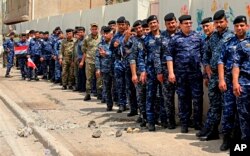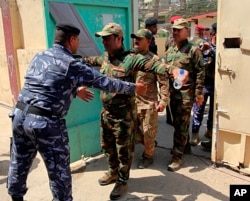Amid threats from Islamic State group, getting in and out of the polling stations safely will be the prevailing thought on Iraqi voters' minds May 12 when the country goes to the polls to choose a new parliament and the prime minister.
Islamic State militants have threatened to carry out attacks ahead of the elections — the first ones since the group's defeat in the country.
IS last month began a social media campaign discouraging people from participating in the elections and threatening to target polling stations.
On April 20, the group posted an infographic on social media detailing three attacks it claimed it conducted in Anbar, Kirkuk and Diyala provinces. It said its members killed 25 candidates, party members and their guards in the attacks that targeted "polytheistic democracy," referring to Iraqi political candidates for the elections.
The group on April 22 released an audio message accusing the Iraqi government of being a proxy of Iran. Later, the group's main outlet, Amaq News Agency, released a video allegedly showing IS jihadists shooting two election "advocators" in the town of al-Tarmiyah, in the Saladin province.
IS also has claimed responsibility for the assassination of a 45-year-old candidate from the National Coalition alliance.
Security arrangements
Iraqi officials are confident, however, that they can handle the IS threat and say the polling stations will be well protected.
Saad Maan, the spokesman of Iraq's Interior Ministry, told VOA that security forces have prepared a "careful" plan to protect the stations and voters.
"The plan will provide utmost safety and security of elections in Baghdad and other Iraqi cities," he said. "Everyone can be assured to vote safely. We will protect the polling stations, the transfer of ballot boxes, and voters."
IS militants remain active mostly in Kirkuk, Diyala, Saladin and Nineveh provinces that are disputed between the central government and the Kurdistan region, and the vast desert terrain of Anbar.
Iraq will close its airports and border crossings for 24 hours during the election.
The shutdown will come into effect at midnight Friday. Security forces also will suspend travel between provinces and restrict the movement of vehicles Saturday.
Ali Hussaini, the spokesman of Popular Mobilization Forces in northern Iraq, told VOA that Iraqi forces will take additional security measures in those areas that are politically contentious due to the conflicting territorial claims of Kurds and Arabs.
Hussaini said IS militants threatened villagers in southern Kirkuk and Hawija town with kidnapping if they vote in elections set for Saturday.
"Iraqi forces will be deployed to Hawija and its surrounding areas on the election day to guarantee that everyone votes freely," he told VOA.
Regional influence
Iran has great influence over Shiite majority Iraq's political landscape. Major candidates, including incumbent Haider al-Abadi and his rivals Nuri al-Maliki and Hadi al-Amiri, all lean toward Iran.
Reza Haghighat Nejad, an Istanbul-based analyst on Iran, says the victory of Iran's allies in the upcoming election of Iraq can be quite significant. "It can greatly shake the balance of power in the region and change the form of diplomacy practiced by regional players."
Iran is not the only country that has influence on the political field in Iraq. Denise Natali, another Turkey-based analyst, said Iran, Turkey and Gulf states are trying to back certain candidates.
"That will continue even after the elections and during the process of the formation of a coalition government in Baghdad. External influence on Iraq cannot stop as long as the Iraqi state remains weak within," Natali said.
There are close to 7,000 candidates in the field who are running for 329 parliament seats. The May 12 election will be the fourth since the ouster of the Saddam government in 2003, and analysts say that in order for Iraq to remain free of external influence, all the major parties will have to agree on protecting Iraq's sovereignty.
VOA's Turkish Service contributed to this report.







